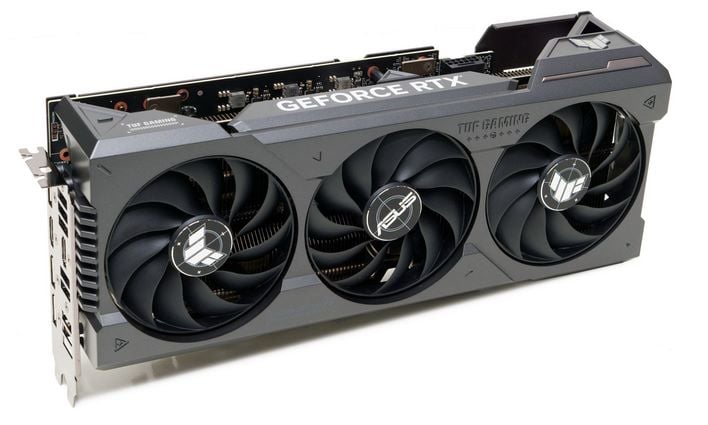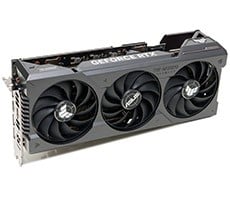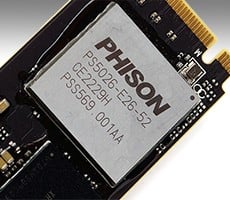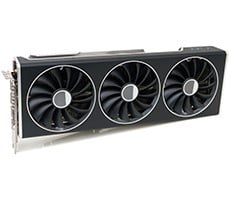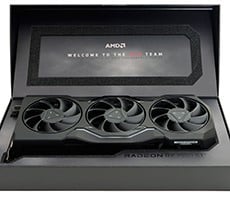ASUS TUF GeForce RTX 4070 Ti OC Review: NVIDIA’s Ada Lights Up CES
We also spent some time overclocking our ASUS TUF GeForce RTX 4070 Ti to wring out some additional performance from its GPU and GDDR6X memory...
Overclocking The ASUS TUF GeForce RTX 4070 Ti
Like previous-gen GeForces, Ada Lovelace-based GeForce RTX 40 series cards feature GPU Boost, which scales frequencies and voltages, power and temperatures permitting, based on the GPU's workload at the time. Should a temperature or power limit be reached, GPU Boost will drop down to the previous boost frequency / voltage stepping, to bring power and temperatures down gradually and not cause any significant performance swings.
When overclocking, the maximum boost clock and power limit can be tweaked and tuned to increase performance with most cards, however.
ASUS TUF GeForce RTX 4070 Ti Hardware Monitor - Default Settings
Like previous-gen cards, the ASUS TUF GeForce RTX 4070 Ti is still voltage or power limited in most circumstances to prevent damage and ensure the card's longevity. It is those limits that will usually be the gating factor in any overclocking efforts.
With the ASUS TUF GeForce RTX 4070 Ti, the power target can be increased by up to 25% and the max temperature target from 84°C to 88°C. Though the latest version of MSI's Afterburner has the option to alter voltage as well, it was greyed out with the build we used with the RTX 4070 Ti. We were still able to increase the GPU clock significantly, however.

ASUS TUF GeForce RTX 4070 Ti Hardware Monitor - Overclocked
We used the frequency offsets with the power and temperature target sliders available in Afterburner to manually push the ASUS TUF GeForce RTX 4070 Ti's frequencies beyond its defaults. First, we turned up the temperature and power targets to their maximum values, and then increased the GPU and memory clock offsets until the test system was no longer stable, showed on-screen artifacts, or performance peaked due to hitting the power limit. We did not, however, alter fan speeds because this card ran so cool without any modification in that regard.
We were not able to get our hands on a spec sheet to see what ASUS lists the TUF GeForce RTX 4070 Ti OC Edition's expected boost clock, but in our tests it routinely boosted to over 2,800MHz while in its stock configuration (visible in the screenshot at the top of the page). While overclocked, we were able to take its GPU clock all the way up to an impressive 3,045MHz with a 21.5Gbps memory speed.

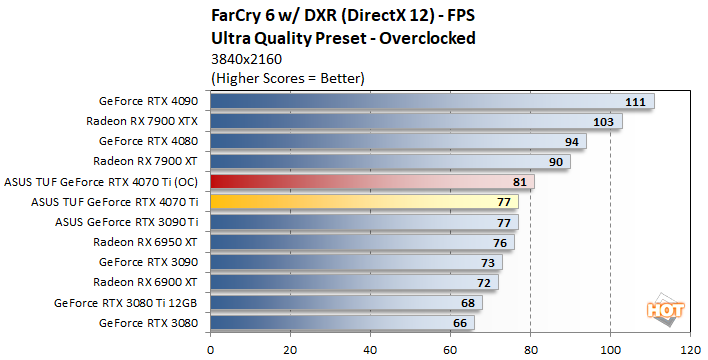
With the card overclocked, we re-ran some tests and saw some decent performance gains, but they weren't enough to catch the next card up the rankings in either test. That said, we never hit the card's power limit and temperatures peaked at only 70C, so with some voltage modifications and additional tweaking, we expect to see GeForce RTX 4070 Ti cards hit higher clocks that we did here.
Total System Power Consumption
Throughout all of our benchmarking and testing, we also monitored noise output and tracked how much power the GPUs were consuming in our test system. Our goal here is to give you an idea as to how much power each GPU used while idle and also while under a heavy workload. These power numbers were captured during FarCry 6 testing, with ray-tracing enabled, and are representative of total system power consumption: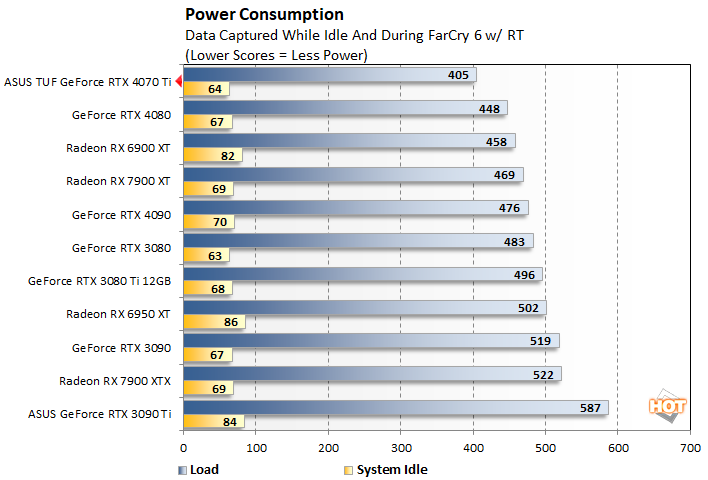
The ASUS TUF GeForce RTX 4070 Ti turned out to be a relatively power-friendly, at least in comparison to all of the higher-end graphics cards we tested. Idle power was nearly the lowest, and peak load power was the lowest of the bunch.
Noise is not a concern with with the ASUS TUF GeForce RTX 4070 Ti, either. At idle or when under light loads, the ASUS TUF GeForce RTX 4070 Ti is effectively silent, because its fans spin down completely. When under a heavy, sustained workload, the card's fans do spin up, but it runs so cool and quiet they never produce anything more than a dull whir and are barely audible over the other fans in our test rig.ASUS TUF GeForce RTX 4070 Ti OC Edition Review Summary
The MSRP for GeForce RTX 4070 Ti cards will start at $799. NVIDIA, however, will not be producing a Founders Edition card and all of NVIDIA’s partners are bringing multiple versions to market, with very different price points. The ASUS TUF GeForce RTX 4070 Ti OC Edition we featured here will be priced at $849, and ASUS has ROG STRIX-branded 4070 Ti card coming priced as high at $1,049. Compare those prices to the GeForce RTX 3070 Ti, which arrived at $599, and it’s obvious this GPU generation is commanding a steep premium.In all fairness, everything from the cardboard to the capacitors required to build graphics cards has gotten more expensive since the RTX 30 series launched, but that doesn’t take away from the fact that gamers will have pony up big bucks to partake in some Ada action. In addition, AMD's Radeon RX 7900 XT is available for approximately another $50 - $100, and that card offers comparable performance in most circumstances, but with a much larger memory configuration (20GB vs. 12GB) and support for DisplayPort 2.1 – two things that may have implications down the line as more advanced games and high-res / high-DPI / high-refresh monitors arrive.
We also have to caution users about these cards’ physical requirements. Despite power requirements that are more manageable than previous-gen high-end cards, all of the air-cooled RTX 40 series cards we’ve tested so far have been quite large and may not fit in every case. In fact, Dave’s liquid-cooled Maingear rig can’t accommodate any of the air-cooled RTX 40-series cards that we have in the lab currently, due to their form factor.
Those caveats aside, the GeForce RTX 4070 Ti kicks some serious butt. The ASUS TUF GeForce RTX 4070 Ti we tested ran cool and quiet, performance typically matched or exceeded the previous-gen flagship GeForce RTX 3090 Ti, and power consumption was modest versus the other high-end cards we tested. We think many gamers or creators, looking for a new GPU in its price range, will be happy with the new GeForce RTX 4070 Ti. It brings NVIDIA’s leading-edge GPU architecture, the latest features, and strong 4K performance down to the lowest price point yet for a GeForce RTX 40 series card.


